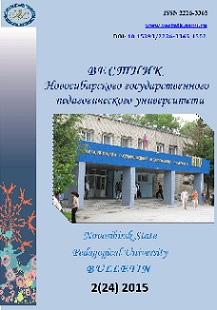СЕМАНТИКО-ПРАГМАТИЧЕСКИЙ ПОТЕНЦИАЛ ЛЕКСЕМЫ ПОЗИТИВНЫЙ В СОВРЕМЕННОМ РУССКОМ ЯЗЫКЕ
THE SEMANTIC AND PRAGMATIC POTENTIAL OF LEXEME POSITIVE IN MODERN RUSSIAN LANGUAGE
Author(s): Lyudmila Nikolaevna KhramtsovaSubject(s): Language and Literature Studies
Published by: Новосибирский государственный педагогический университет
Keywords: semantics; pragmatics; dynamic processes in language; language picture of the world; language consciousness
Summary/Abstract: The article is devoted to the current tendencies in the semantics and pragmatics of the word positive in the modern Russian language. The general idea of the article is that the chang-es in the lexical meaning reflect the emergence of fundamentally new features of the Russian mentality, influenced by the cultural stereotypes of the Western world. after studying mass media texts it is stated that the word positive expands its semantics, new semantic features appear that are not represented in dictionaries. The sphere of its usage is changing – it goes beyond the scientific style and becomes wide-ly used in journalism and in colloquial speech. Lexical compatibility of the word is expanding, it becomes possible to use it with animate nouns.This paper studies the collocation “a positive person”, the author concludes that the new meaning of the word shifts towards semantic fields "activity", "smiling", "sociability".That allows to speak about the foreign semantic origin and the influence of western stereotypes on Russian people’s picture of the world. Special attention is paid to the analysis of reflective statements of Internet users. the anal-ysis of comments to the expression a positive person permits to trace the foreign origins of the expression, the dynamics of its use and its evaluative character.
Journal: Вестник Новосибирского государственного педагогического университета
- Issue Year: 2015
- Issue No: 2
- Page Range: 103-116
- Page Count: 14
- Language: Russian

